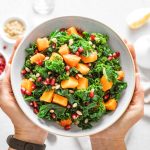How fruits and vegetables combat cancer cells
 (NaturalHealth365) Researchers have recently uncovered three potent compounds – apigenin, fisetin, and salicylic acid – in plant-based foods that show promising potential in combating cancer cells and enhancing immune function. These compounds, commonly found in fruits and vegetables, exhibit remarkable abilities such as inhibiting cancer cell development, blocking angiogenesis, inducing cancer cell death (apoptosis), and detoxifying carcinogens.
(NaturalHealth365) Researchers have recently uncovered three potent compounds – apigenin, fisetin, and salicylic acid – in plant-based foods that show promising potential in combating cancer cells and enhancing immune function. These compounds, commonly found in fruits and vegetables, exhibit remarkable abilities such as inhibiting cancer cell development, blocking angiogenesis, inducing cancer cell death (apoptosis), and detoxifying carcinogens.
This discovery has significant implications for cancer prevention and treatment strategies. It suggests that dietary interventions rich in these compounds could play a crucial role in mitigating cancer risk and improving therapeutic outcomes.
Nutrients that make cancer cells die
Apigenin works on cancer cells by inducing apoptosis (cancer cell suicide) and also reducing the expression of a gene known to help with the cancer’s growth. It also limits the diameter of blood vessels, restricting the nutrient flow to the tumor. This ensures that a tumor will shrink and paralyze its ability to spread.
Andrea Doseff, an Associate Professor of Internal Medicine and Molecular Genetics at Ohio State, sees apigenin as a way to normalize cancer cells. Apigenin has been shown to have remarkable anti-inflammatory antioxidants and anti-carcinogenic properties. These properties work on the cellular and molecular levels to ensure a healthy environment for all cells.
The researchers also showed that apigenin binds with an estimated 160 proteins in the human body, suggesting other far-reaching health benefits.
A great reason to consume parsley, celery and chamomile tea
Parsley, celery, and chamomile tea are common sources of apigenin. It is a citrus bioflavonoid also found in dandelion root coffee, thyme, peppermint, lemon balm, artichoke root, basil, Chinese cabbage, bell pepper, garlic, guava, onions, garlic, oranges, and wheat sprouts.
Apigenin is abundant in the Mediterranean diet and is credited with a lower-than-average cancer rate for any population that adheres to it.
Since apigenin is a naturally occurring plant flavone abundantly present in common fruits and vegetables, it is important to look to the organic produce section as a natural drug factory that not only treats some of the so-called horrific conditions but also rejuvenates overall health.
Why is fisetin so important?
Fisetin is a unique polyphenol flavonoid found in many plants and fruits, especially strawberries and mangoes. Its capabilities are far-reaching, and new studies show that it has strong anti-cancer properties.
The inherent benefits have been demonstrated in breast cancer cells. It has been shown to help rupture cancer cell membranes and interfere with how cancer cells make energy. At the same time, it has proven to activate various gene-related conditions that ensure the demise of the cancer cells while leaving the healthy cells alone.
It is common for any cancer to hijack and pervert various healthy gene-signaling pathways to aid the survival of the cancer. In prostate cancer, not treatable with androgen-suppressing therapy, it was found that fisetin could reclaim an important gene pathway, overcoming the hijacking mechanism and assisting in the demise of the prostate cancer cells.
University of Wisconsin researchers have also shown that fisetin uses similar mechanisms to help with lung cancer. It again interrupts cancer gene signaling. Other data suggest that fisetin can be an effective agent against melanoma.
The science is there, and it lays a solid foundation for the intake of this nutrient to assist in the prevention and reversal of cancer. While no specific amount is currently documented, it still sends the message that it is a powerful and safe addition to any diet.
Fisetin is commonly found in many fruits and vegetables, including apples, persimmons, grapes, kiwis, strawberries, blueberries, onions, and cucumbers.
Let’s not forget the value of salicylic acid
The Journal of Clinical Pathology published an article that shows salicylic acid is present in fruits and vegetables. Salicylic acid is a COX-2 inhibitor and an anti-tumor agent that is now recognized by researchers as providing protection against many types of cancer.
Fruits and vegetables are natural sources of salicylic acid. This list shows how abundant salicylic acid is in nature.
The foods with the highest amounts of salicylic acid include alfalfa, broccoli, cucumber, fava beans, spinach, sweet potato, green pepper, olive, mushrooms, tomato, chicory, granny smith apples, avocadoes, cherries, red grapes, mandarin, tangelo, apricots, blackberries, blueberries, cantaloupe, dates, pine nuts, macadamia nuts, almonds, peanuts curry powder, dill, oregano, paprika, rosemary, and thyme.
Salicylic acid is a phenolic compound related to polyphenols such as flavonoids, which have similar actions and are vital for health.
Plants possess so many other life-giving chemical values that are not yet fully understood. A better tomorrow won’t come from chemistry but from the newly discovered benefits of plants. One final note, to avoid unwanted chemicals in your diet, eat only organic produce for a healthier life.
Editor’s note: Discover the best ways to naturally eliminate the threat of cancer, own the Stop Cancer Docu-Class created by NaturalHealth365 Programs.
Sources for this article include:
NIH.gov
NIH.gov
NIH.gov
Medicalnewstoday.com
Sciencedaily.com



